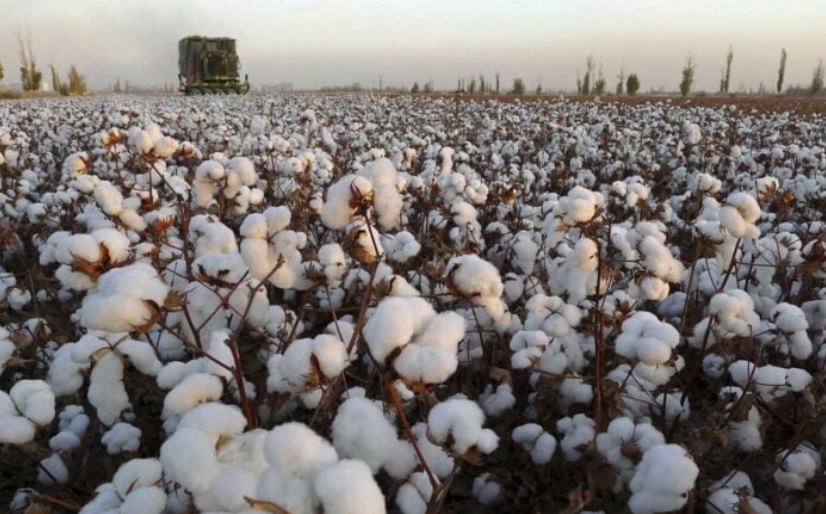A vote of confidence in Greek cotton from major European brands
By Danai Alexaki

“Cotton is a product of strategic importance for the country, as it has been produced industrially and professionally since the end of the 19th century. Therefore, Greece has a very long tradition. It is consistently among the 10 most exportable products of the country and among the 3 most exportable agricultural products,” Antonios Siarkos, president of the European Cotton Alliance, said in an interview with Naftemporiki TV channel.
Speaking of the country’s “white gold”, he said that the sector’s turnover reaches 1 billion euros, while over the last 15 years, production has stabilized around 330,000 tons of refined grains.
“In Greece, about 2.5 million stremmas are cultivated, which is about 10% of the country’s cultivated land, by far the largest crop in the country,” Siarkos underlined.
This year, however, due to weather phenomena and especially storm Daniel, a decrease of around 40% has been recorded compared to the historical average that has been achieved over the years.
“Our production marginally exceeds 200,000 with the center of cotton cultivation being Thessaly. It’s a big blow, after what happened last summer with storm Daniel. It essentially happened just before the product was harvested, leaving businesses exposed,” he noted.
“The industry is 90-95% export oriented. Greece is the leader in the EU, it represents 80% of European production and is a very important country in terms of international export trade. It is among the 7 largest exporters in the world (with the US first and Brazil second). We have giants to compete with. Obviously, this has to do with the very high quality of the product we produce and the great know-how we have developed, but also with the special climatic and soil conditions. A lot of money has been invested by both companies and producers over the years and a very important know-how has been developed.” “Cotton is the premier textile natural fiber. The main competition of cotton comes mainly from synthetic fibers and polyesters which in recent years have seen a boom. At the moment we are experiencing a trend towards natural textile fibers. More specifically, consumer sensitivity for products with a high environmental and social responsibility has significantly increased. By extension, this has led the fashion industry to the need to look for ways to produce textile products,” he also pointed out.
The 4 crash tests for the Greek economy
The first quarter of the year is expected to be decisive for the course of the Greek economy. From next week until the middle of March, there will be a series of reports concerning Greece and the eurozone, while the course of implementation of the National Recovery Plan will also affect the Greek economy. The main target for this year remains the achievement of a growth rate of 2.9%, placing Greece in a particularly advantageous position compared to other strong economies of the eurozone as some of them are “flirting” with recession.
The EU Commission’s winter forecasts
The EU Commission will publish on Thursday, February 15, its winter forecasts for the economies of the member states. As geopolitical turmoil, especially in the Middle East, has increased uncertainty and risks of a rise in inflation, the upcoming release of economic figures is expected to attract strong interest.
The report on the Recovery Plan
The European Commission’s interim report on the progress of the implementation of the Recovery and Resilience plans will be made public in February. The messages about the implementation process of “Greece 2.0” are positive. Greece has so far managed to receive from the Recovery Fund more than 40% of the funds it is entitled to – but this does not mean that all of them have been absorbed. At the level of member states, so far, 221 billion euros have been disbursed, which corresponds to approximately 30% of the total funds of the Recovery Fund.
Already Greece is advancing the procedures in order to submit the 4th request for the payment of 3.3 billion euros in April, approximately 1 billion euros in subsidies and 2.3 billion euros in loans. In a total of 20 milestones, as competent sources pointed out, there are still some outstanding issues which need to be closed by the end of March or early April.
ELSTAT data
With the Greek GDP growing by 2.1% in the third quarter of 2023, outperforming the eurozone, all eyes are turned on the data that the Greek Statistical Authority will announce on March 7 regarding the course of the GDP in the last quarter of 2023.
Rating agencies
After Scope Ratings, which on January 26 kept the assessment of the Greek economy unchanged, DBRS is expected to announce its decision on March 8. However, the most important date for the first quarter of the year is March 15, as the rating agency Moody’s will publish its report on the Greek economy. It is the only rating agency that rates the Greek debt with Ba1, one grade below the investment grade, and as a result the interest is focused on whether it will proceed with an upgrade.
(Editor: wangsu )


